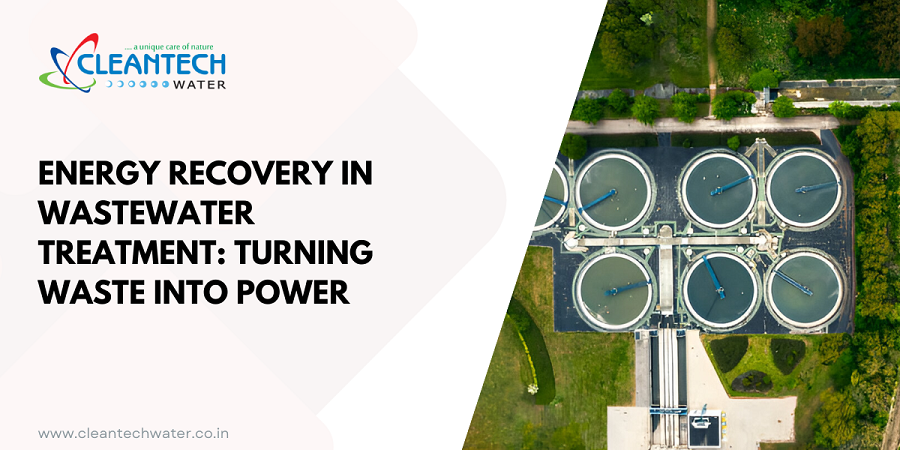Wastewater is often perceived as a byproduct that needs disposal. However, modern advancements in wastewater treatment technology have revealed its untapped energy potential. Businesses and property owners looking to invest in smart wastewater treatment solutions can benefit from energy recovery, reducing operational costs while promoting sustainability.
This article explores how wastewater treatment plants can harness energy from sewage, transforming waste into a valuable resource.

Understanding Energy Potential in Wastewater
Organic Matter and Its Energy-Rich Properties
Wastewater from residential, commercial, and industrial sources contains high concentrations of organic matter, including fats, proteins, carbohydrates, and other biodegradable substances. These materials are rich in chemical energy, which can be converted into biogas through biological processes. By leveraging anaerobic digestion, wastewater treatment plants can generate renewable energy and reduce sludge volume.
Thermal Energy in Wastewater
Wastewater from homes and industries carries significant amounts of thermal energy, particularly from hot water used in showers, dishwashers, industrial processes, and other activities. This thermal energy, if recovered, can contribute to district heating and cooling applications. Technologies such as heat exchangers help capture and repurpose this otherwise wasted heat, improving overall energy efficiency.
Chemical Energy and Its Recovery Potential
In addition to organic matter, wastewater contains dissolved chemicals and nutrients that can be harnessed for energy recovery. Elements like nitrogen, phosphorus, and sulfur can be extracted and used in agriculture or industrial applications. Additionally, electrochemical technologies such as microbial fuel cells (MFCs) can convert chemical energy directly into electricity, offering a promising avenue for sustainable power generation.
Key Energy Recovery Technologies
1. Anaerobic Digestion
Anaerobic digestion is a biological process that decomposes organic matter without oxygen, generating biogas as a byproduct. It occurs in a controlled environment within specialised digesters found in wastewater treatment plants.
2. Biogas Production and Utilisation
Biogas primarily consists of methane (CH4) and carbon dioxide (CO2), making it a viable alternative to fossil fuels. The captured biogas can be used for electricity generation, heating, or even conversion into biomethane for vehicle fuel. Many sewage water treatment plants integrate combined heat and power (CHP) systems to maximise the efficiency of biogas utilisation.
3. Microbial Fuel Cells (MFCs)
MFCs are an emerging technology that uses bacteria to break down organic matter while generating an electrical current. As microbes consume organic compounds, they release electrons, which are transferred through an electrode system to produce electricity.
MFCs offer several advantages, including low operational energy requirements, minimal sludge production, and direct electricity generation. However, their widespread implementation is limited by factors such as high costs, slow bacterial growth rates, and scalability challenges.
4. Thermal Energy Recovery Through Heat Exchangers
Heat exchangers are commonly used in wastewater treatment plants to recover thermal energy from effluent water. These systems transfer heat from warm wastewater to incoming cold water, reducing the energy required for heating processes.
Recovered thermal energy can be integrated into district heating and cooling networks, supplying nearby residential and commercial properties with sustainable heating and cooling solutions. This approach enhances energy efficiency and reduces reliance on conventional power sources.
5. Hydraulic and Mechanical Energy Recovery
Water flow within sewage treatment plants generates kinetic energy, which can be harnessed using micro-hydraulic turbines. These turbines convert the energy from moving water into electricity, supplementing the plant’s energy needs.
Effluent discharge from wastewater treatment plants often carries enough pressure to drive small-scale hydropower systems. By installing turbines in outflow channels, facilities can capture this energy before water is released into natural water bodies, further enhancing overall efficiency.
Benefits of Energy Recovery in Wastewater Treatment
1. Reduction in Operational Costs
One of the primary advantages of energy recovery in wastewater treatment plants is the significant reduction in operational costs. The plants typically consume large amounts of electricity to power aeration systems, pumps, and other processes. By utilising biogas, thermal energy, and mechanical energy recovery, treatment facilities can lower their dependency on external power sources, leading to long-term financial savings. Additionally, energy-efficient processes reduce the strain on municipal power grids, making operations more cost-effective and reliable.
2. Lower Environmental Impact
Energy recovery technologies help wastewater treatment plants reduce greenhouse gas emissions by offsetting fossil fuel consumption. Traditional treatment processes can be energy-intensive, contributing to significant carbon footprints. However, biogas production from anaerobic digestion provides a renewable energy source that reduces reliance on fossil fuels. Similarly, the use of microbial fuel cells and thermal energy recovery minimises waste and optimises energy use. Additionally, capturing nutrients like nitrogen and phosphorus from wastewater helps prevent environmental pollution and eutrophication in water bodies, ensuring ecological balance.
3. Enhanced Energy Self-Sufficiency in Treatment Plants
Integrating energy recovery solutions allows wastewater treatment plants to become more self-sufficient, reducing reliance on grid electricity. This ensures a stable and resilient energy supply, even in remote or energy-constrained areas. Wastewater treatment plants equipped with biogas-powered combined heat and power (CHP) systems can generate both electricity and heat for their own use, reducing operational vulnerability to energy price fluctuations. Additionally, decentralised wastewater treatment with energy recovery can be a sustainable solution for industrial facilities and communities looking to manage their waste efficiently while producing their own power.
4. Contribution to the Circular Economy and Sustainability Goals
Energy recovery aligns with circular economy principles by transforming waste into a valuable resource. By extracting energy and useful byproducts such as biofertilisers from sewage sludge, wastewater treatment plants contribute to a closed-loop system where waste materials are repurposed rather than discarded. Businesses investing in sustainable sewage treatment solutions can enhance their corporate social responsibility (CSR) efforts, reduce regulatory risks, and improve public perception. Furthermore, supporting energy recovery initiatives aligns with global sustainability goals such as the United Nations’ Sustainable Development Goals (SDGs), particularly those related to clean energy, climate action, and responsible resource management.
5. Reduction in Operational Costs
One of the primary advantages of energy recovery in wastewater treatment plants is the significant reduction in operational costs. By utilising biogas, thermal energy, and mechanical energy, treatment facilities can lower their dependency on external power sources, leading to long-term savings.
6. Lower Environmental Impact
Energy recovery technologies help wastewater treatment plants reduce greenhouse gas emissions by offsetting fossil fuel consumption. Additionally, efficient resource utilisation minimises waste generation, further promoting environmental sustainability.
7. Enhanced Energy Self-Sufficiency in Treatment Plants
Integrating energy recovery solutions allows wastewater treatment plants to become more self-sufficient, reducing reliance on grid electricity. This ensures a stable and resilient energy supply, even in remote or energy-constrained areas.
8. Contribution to the Circular Economy and Sustainability Goals
Energy recovery aligns with circular economy principles by transforming waste into a valuable resource. Businesses investing in sustainable wastewater treatment solutions can enhance their corporate social responsibility (CSR) efforts and contribute to global sustainability goals.
Contact Us for Tailored Wastewater Treatment Solutions!
Challenges and Considerations
1. Infrastructure and Technology Investment
Implementing energy recovery technologies requires significant initial investment in infrastructure and advanced treatment systems. Businesses must assess the return on investment (ROI) and long-term benefits before committing to large-scale adoption.
2. Regulatory and Policy Constraints
Regulatory policies governing wastewater treatment and energy recovery vary across regions. Businesses must navigate these frameworks to ensure compliance while maximising energy recovery potential.
3. Maintenance and Operational Challenges
Advanced energy recovery technologies require specialised maintenance and operational expertise. Training personnel and implementing robust monitoring systems are essential for ensuring efficiency and longevity.
Future Trends and Innovations
Advancements in Bioenergy from Wastewater
Research and innovation in bioenergy continue to enhance the efficiency of biogas production and microbial fuel cells. Emerging techniques aim to maximise energy yields while minimising costs.
AI and Smart Systems for Optimising Energy Recovery
Artificial intelligence (AI) and smart monitoring systems are revolutionising wastewater treatment plants by optimising energy recovery processes. Real-time data analysis and predictive maintenance improve efficiency and reduce operational disruptions.
The Role of Wastewater Treatment in Global Energy Transition
As the world shifts towards renewable energy, wastewater treatment plants play a crucial role in the transition. Sustainable sewage management solutions contribute to a greener and more energy-efficient future.
By investing in innovative sewage treatment solutions, businesses can achieve cost savings, regulatory compliance, and environmental benefits while contributing to a more sustainable future.
How Wastewater Treatment Plants Can Generate Energy
Wastewater treatment plants are more than just essential for cleaning water—they can also be powerful sources of renewable energy. By implementing energy recovery technologies, these facilities can transform waste into valuable power, reducing operational costs and contributing to a sustainable future.
If you’re ready to explore how your wastewater treatment plant can become more energy-efficient and eco-friendly, it’s time to take action. From biogas production to advanced membrane filtration systems, there are numerous ways to harness the untapped energy in wastewater. By adopting these innovative solutions, your facility can not only reduce its carbon footprint but also drive economic savings.
Invest in Advanced Wastewater Treatment Plants with Cleantech Water
Take the next step toward sustainability with our advanced wastewater treatment plant solutions. Whether you need a packaged sewage treatment plant, an MBBR sewage treatment plant, or a custom solution, Cleantech Water delivers cutting-edge technology to optimise wastewater management.
Reduce costs, enhance energy efficiency, and meet environmental regulations with our innovative systems. As one of the leading sewage treatment plant manufacturers, we help businesses turn wastewater into a resource, not a liability.
Invest in smart wastewater treatment today and contribute to a cleaner, greener future. Contact us at +91-9558996411 or write to us at info@cleantechwater.co.in to discuss your wastewater treatment needs and transform your operations with sustainable solutions!

